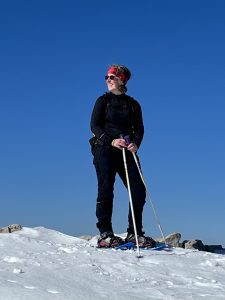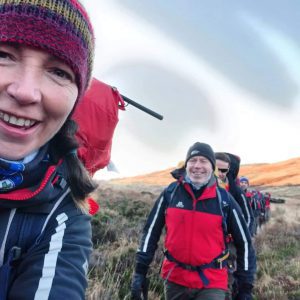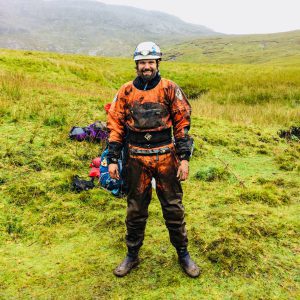Volunteers’ Week | Meet Our Volunteers

Volunteers’ Week | Meet Our Volunteers
Mary Abercrombie | Ochils Mountain Rescue
Mary Abercrombie: hill loving outdoor girl with medical skills and mountain rescue volunteer, talks about her experiences with Ochils Mountain Rescue Team.
I was inspired to join mountain rescue, and combine my love of the hills with my medical background (I am a GP), when my uncle was rescued from Glen Etive, after a long (6 day) and frustrating search and a hugely technical rescue. I am delighted to say that I have now been a volunteer for 10 years.
It’s one thing to assess and treat people in my surgery but it has been such a rewarding experience to take my skills into the hills and I continue to be thoroughly impressed with the skills of my non-medical team mates, who are always keen to learn. I’ve now been ‘promoted’ to Medical Officer of the Ochils Team. Through Covid times this has been a challenging experience and has added to the many and varied duties needed to keep the medical side of the team operating safely and effectively.
I have been walking in Scotland for many years having completed my Munros in 1998, followed by the Corbetts and I am currently chipping away at the Grahams. I LOVE walking anywhere but preferably with my dog (and husband!).
Lucy Wallace | Arran Mountain Rescue
Lucy Wallace, mountain leader, wildlife guide and mountain rescue volunteer, talks about her experiences with Arran Mountain Rescue Team.
Lucy said, “I joined Arran MRT 10 years ago originally as I wanted to give something back to the mountaineering and hill walking community. A decade on and I still love it. I love the feeling of being a small part of something much bigger than me. A mountain rescue team is definitely greater than the sum of its parts. Everybody does their bit and works together. What we can achieve is pretty cool.
The nature of mountain rescue means that there is a real mix of callouts – some good and some bad. However, on the good days, when you can really help someone having a bad day, it’s a great feeling to make a difference. For instance, stretchering someone off Goatfell with a badly broken leg and knowing that, thanks to the team, they will make a full recovery, is just amazing.”
Tim Hamlet | Assynt Mountain Rescue
Why did you choose to join a Mountain Rescue Team?
At the age of 17 I broke my leg on steep snow after an ice climb on Aonach Mor. I can still remember the feeling of total helplessness and then the profound relief when I was rescued. Since that experience I felt I would like to give something back and be able to help others in the future.
How long have you been in a Mountain Rescue Team and what is your current role on the team?
I have been involved with Mountain Rescue Teams for 9 years, first with Ochils MRT then with Assynt MRT when we moved to the North West Highlands. I have had many roles within the Assynt MRT, as Training Officer, Deputy Team Leader and now as the newly appointed Team Leader.
What is the most rewarding thing about being in an MR team?
I think the expression on someone’s face when they realise their seemingly helpless situation is changing. I know that feeling of relief from personal experience and it is a joy to witness.
What is the hardest thing about being in an MR team?
Those situations where you know you’ve got a body recovery job to do. However the service we can provide in finding and bringing back a loved one to their family is such an incredibly important task. These taskings are never easy but despite the sadness and technical challenges I count it a privilege to be there for the grieving family.
How do you feel after a successful rescue? 
We operate as a team and the sense of achievement is felt as a team as well as individually. I would say there is also a sense of relief at a job completed and well done.
What kinds of incidents do you get called out to?
We are tasked by Police Scotland and our involvement can range from searches at low altitudes to technical rescue for accidents high on the hill. Our operational area is large so even getting to the rescue RV point can sometimes take members well over an hour of driving. We have a strong working relationship with the local Police and they will often call us for detailed information about a particular mountain or remote location.
Have you noticed much difference in the types of rescue or the numbers of rescues you have attended since the start of the pandemic?
I would say that we have been a lot quieter during the pandemic as would be expected. Since Scotland is starting to return to the new normal we have not particularly noted a rapid rise in call outs or change in the nature of those call outs. I know that is not the experience of some of the other teams in high footfall mountain areas.
What other changes has the pandemic meant for your team?
The pandemic has significantly interfered with team training. For example, we had a recruitment drive in 2019, and many of our new members now on the callout list have never had any helicopter training. I believe we have managed to bounce back very well considering and a number of recent call outs along with summer training has consolidated the team spirit and operational capability.
What have you learnt from becoming a team leader?
The role of team leader is both interesting and diverse. The ability to lead and coordinate is key but really I see my role as that of team facilitator. The team is key. I have so much respect for all the team members generous donation of their time and skills. And this is often deployed in poor weather conditions, darkness and difficult mental and physical situations. It is quite simply down to each volunteer’s contribution that makes it all possible.